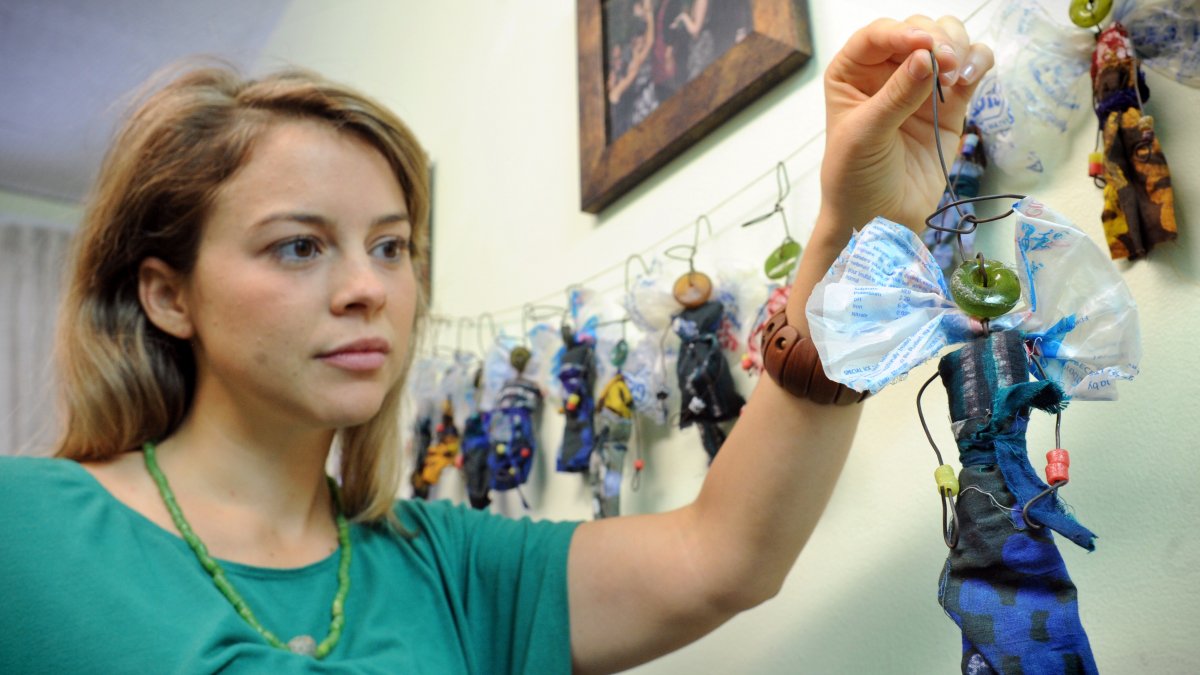ABAN tackles two epidemics
ABAN was developed in Launching the Venture, the primary venture-creation program at Carolina.

Callie Brauel’s suitcase probably raised some eyebrows at the airport.
Hundreds of small zippered plastic bags filled it. The bags were made by homeless children from discarded water sachets that litter the streets of Ghana’s capital city, Accra.
Making and selling the bags to provide income to the street children is the premise of Brauel’s venture,aBAN on Neglect. Now named ABAN (A Ban Against Neglect), it was developed in Launching the Venture (LTV), the primary venture-creation program at UNC. ABAN won the $15,000 Stedman Social Entrepreneurship Award at the 2010 Carolina Challenge, UNC’s annual entrepreneurial business plan competition for students, faculty and staff.
Brauel and Rebecca Brandt, a Concordia University student, arrived in Ghana as foreign exchange students in 2008. They were stunned by the amount of plastic litter in the streets and the lack of any means of disposal. “We wondered how a city of more than 2 million people could not have a single garbage can,” says Brauel, a 2009 UNC graduate with a degree in business administration and economics.
The inexpensive plastic bags of pure water are critical to the health of Ghanaians, but create an epidemic of waste. Forty tons daily.
Brauel and Brandt soon discovered a more disturbing epidemic haunting Accra: homeless children – 30,000 of them – neglected and sleeping in the streets.
“Rebecca and I volunteered with some nonprofits to help the children but every day at 5 p.m. the doors would shut and we’d go home to our safe environments, which was frustrating. We wanted to do more,” Brauel says.
The two decided to help the children by creating a steady income stream. After developing a mock nonprofit company for recycled products for a class, the two hit upon the idea for ABAN.
“Why not help solve both street epidemics with one solution? We had a free, plentiful resource in the thousands of water bags that surrounded us every day,” says Brauel.
Nonprofits provided sewing machines. With the children’s help, the two students collected sachets, sanitized them and added zippers to create bags to sell. Now, the children create several products in what Brauel calls, “a model that allows us to sustain all of our programs – housing, living wage, daycare, health care, business and English education and matching savings- through product sales.”
ABAN really took off after Brauel and Brandt returned to the U.S., wanting to make the effort sustainable. Brauel talked with assistant professor Larry Chavis at the UNC Kenan-Flagler Business School, who directed her to LTV. LTV participants test the feasibility of their ideas for commercial or social ventures. Those with potential for success then develop business and finance plans.
Brauel soon added two teammates: sophomore Diana Lee and junior Claire Corriher. Josh King, a sophomore anthropology and psychology major, joined the team during the business plan phase.
Now that ABAN is gaining momentum, its two creators will increase their time in Ghana to four to five months each year. They have set up internships for UNC students, and have recruited some students already in Ghana to help with the programs. Brauel says that she is constantly busy, but has many “talented and passionate students at UNC” to help.
She says, “My favorite part of the week is Skyping with the Ghana Programs Director and our girls in Ghana- seeing that the work we are doing over here is having a huge impact on so many lives across the ocean makes it all worthwhile.”
Visit ABAN.




